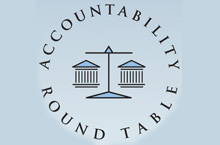by Tim Smith.
The full version here, published as an edited opinion piece, The Age Friday November 26th 2010.
Tim Colebatch recently criticised the Brumby Government as having “refused to run an open government” (Ballot box overflowing with choice, The Age November 23, 2010). The editor of the Sunday Age (21 November), expressed a reluctance to choose between Labor or the Coalition and concluded “if we were put up against a wall, we would say, maybe Labor, but it will need to change its ways in a fourth term — drop the hubris, risk letting the sunshine in. The prospects of that are slim.”
To what were they referring? Perhaps they had in mind the government’s decision to instruct ministerial staff not to appear before a parliamentary committee investigating the handling of the Windsor Hotel planning issues. Perhaps they had in mind the use of our Freedom of Information legislation to withhold access to significant contracts and critical documents such as the Public Sector Comparator, without which it is not possible to assess a government’s economic performance or major infrastructure decisions such as the desalination plant.
These issues are fundamental to our democracy and to the choices we have to make in this State election. But they have not received any detailed coverage in the media. Why is that? Is it assumed that the other parties would be no different if they were in government and that nothing can be done?
What are the positions of Labor, the Coalition and Greens on open and accountable government? The Accountability Round Table (ART) sought their views. It has received comprehensive, detailed and considered responses. It is not possible to do justice to those responses in this short article. (They are available on our website). Instead, I will refer to the responses on the above two issues and some of the major points raised. While there are differences between the parties, the responses give cause for hope.
First, the right of Parliamentary Committees to question ministerial staff. In its response to the ART, Labor maintains that a government is entitled by convention to direct ministerial staff not to attend and that this should continue. It advances a detailed argument in support. Nonetheless, it supports the clarification of rules by which Ministers provide evidence to Parliamentary Committees.
The Greens and the Coalition responses support the right of Parliamentary Committees to question ministerial staff and reject the alleged convention. The Coalition responses do not refer to the qualification by Mr Baillieu (when debating Mr Brumby) that Parliamentary Committees have that right “where appropriate”. Assuming that qualification is still made, it needs clarification. The Coalition in its responses, however, did identify the Windsor Hotel case as one situation where advisers should be called.
The second issue is Freedom of Information. The benchmark is the Right to Know system in Queensland and Tasmanian legislation which is based on the Solomon Report. It acknowledges the community’s right to information, removes conclusive certificates and specific exemptions and places the onus on the government to demonstrate that the public interest requires non-disclosure.
The Greens and Coalition express their agreement with that Right to Information philosophy. They also mention some particular issues. For example, the Greens propose that all contracts and Public Sector Comparators should be publicly released. The Coalition criticises, in particular, government reliance on “commercial in confidence’ to withhold information about major projects. The Greens and Coalition each propose an Information Commissioner to make the final decision about FOI requests, independent from government.
To implement this, the Greens propose a referral to the Victorian Law Reform Commission to design a regime similar to that in Queensland. The Coalition proposes that the Information Commissioner report on the application of the Queensland model.
Labor in its response defends its record and expresses a determination to keep improving FOI. It states that it is open to further legislative reform and is “more than ready to examine the models adopted in Queensland and Tasmania”.
So what will happen after the election? Will these promises simply disappear into the ether? Will anything happen? The outcome of the election could be very significant. The Greens, in their response to the ART state that if either Labor or the Coalition wishes to form a minority government with the Greens, they will have to “completely overhaul current disclosure practices”. But whatever the outcome of the election, it is encouraging that the parties in their responses have shown that they take the issues seriously and regard them as important. So should we. What will be critical over the next 4 years is that we do all we can to ensure that the promises made are honoured. In referring to “we”, I include the all-important media, that Fourth Estate that is the watchdog of our Democracy.
Hon Tim Smith Q.C., Adjunct Professor, Faculty of Business and Economics, Monash University and Chair of the Accountability Round Table – www.accountabilityrt.org.

